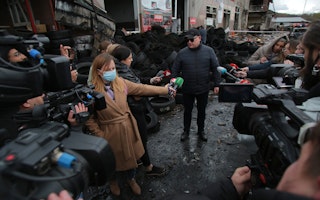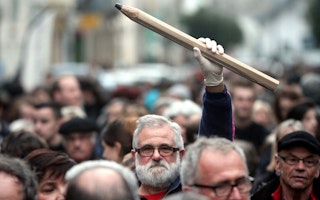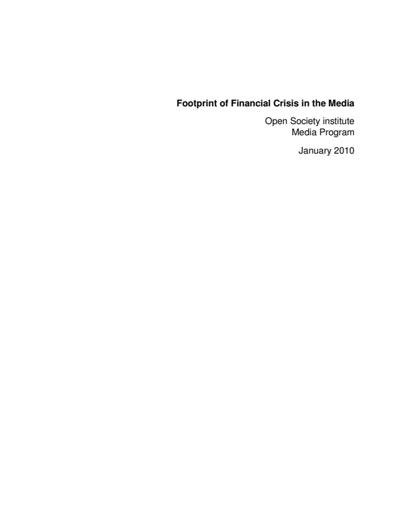This Open Society study explores the impact of the financial crisis on media and news delivery to citizens in 18 countries of Central and Eastern Europe and the Commonwealth of Independent States.
The global economic downturn has affected countless businesses across the region, forcing them to slash costs, lay off employees, and reduce output. Media businesses are no exception. However, when media businesses are hit, it is not just their turnover that suffers: their primary function, the delivery of news to citizens, feels the impact too.
To explore the impact of the crisis on independent media and accountability journalism, the Open Society Foundations carried out a study in 18 post-socialist countries heavily hit by the crisis: Albania, Armenia, Bosnia and Herzegovina, Bulgaria, Czech Republic, Estonia, Hungary, Kyrgyzstan, Latvia, Lithuania, Macedonia, Moldova, Montenegro, Poland, Romania, Serbia, Slovakia, and Ukraine.
The study looks at media performance in 2009 compared with the previous three years, explores the cost-saving measures taken by significant news carriers, and the effects of these measures on output, breadth and depth of coverage, scope of investigative reporting, and opportunities for open public debate.
Key Findings
- Media across the region have lost 30 to 60 percent of their income.
- Media were forced to adopt cost-saving measures, including reduced volume, staff layoffs, reduced investigative reporting, and cuts in international and provincial coverage.
- Several media markets have experienced a flight of foreign investors and bankruptcies of independent outlets.
- The crisis-related constraints and ownership changes have caused an overall drop in the quality of news delivery to citizens.
- Media content has become shallower, more entertainment-centered, increasingly isolationist, more prone to political and business influences, and lacking in investigative bite.
The regional overview and individual country reports are available for download.
Download
- Footprint of Financial Crisis in the Media: Overview (123.02 Kb pdf file)
- Footprint of Financial Crisis in the Media: Albania (91.15 Kb pdf file)
- Footprint of Financial Crisis in the Media: Armenia (75.55 Kb pdf file)
- Footprint of Financial Crisis in the Media: Bosnia & Herzegovina (83.67 Kb pdf file)
- Footprint of Financial Crisis in the Media: Bulgaria (75.65 Kb pdf file)
- Footprint of Financial Crisis in the Media: Czech Republic (102.73 Kb pdf file)
- Footprint of Financial Crisis in the Media: Estonia (82.52 Kb pdf file)
- Footprint of Financial Crisis in the Media: Hungary (88.67 Kb pdf file)
- Footprint of Financial Crisis in the Media: Kyrgyzstan (53.64 Kb pdf file)
- Footprint of Financial Crisis in the Media: Latvia (99.26 Kb pdf file)
- Footprint of Financial Crisis in the Media: Lithuania (61.69 Kb pdf file)
- Footprint of Financial Crisis in the Media: Macedonia (43.76 Kb pdf file)
- Footprint of Financial Crisis in the Media: Moldova (78.04 Kb pdf file)
- Footprint of Financial Crisis in the Media: Montenegro (60.36 Kb pdf file)
- Footprint of Financial Crisis in the Media: Poland (65.31 Kb pdf file)
- Footprint of Financial Crisis in the Media: Romania (93.33 Kb pdf file)
- Footprint of Financial Crisis in the Media: Serbia (66.14 Kb pdf file)
- Footprint of Financial Crisis in the Media: Slovakia (53.39 Kb pdf file)
- Footprint of Financial Crisis in the Media: Ukraine (58.61 Kb pdf file)
Read more
Ukraine’s Independent Media
Q&A: Telling War Stories Under Fire

It is incredibly tough to cover war against an enemy who wields disinformation amid the bombs and bullets. Yet thousands of displaced Ukrainian journalists carry on. What it takes to keep their stories coming.
Documentary Films
Q&A: Harnessing the Power of Documentary Storytelling

Orwa Nyrabia, artistic director of the International Documentary Film Festival Amsterdam, talks to Open Society about his experiences in Syria as a child and during the war, and its impact on his worldview and creative path
Strength in Numbers
Q&A: How Collaborative Journalism Defeats Censorship

Responding to increasingly violent attacks on reporters all over the world, the organization Forbidden Stories brings journalists together to amplify the stories that enemies of a free press want to keep hidden.
